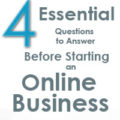The road to entrepreneurial success is anything but simple. If you’re pursuing your American Dream with the conception of a small business, there are a variety of facets to consider before jumping in. From finding capital to tax issues, location concerns to competitors, it’s essential you read these guidelines before dipping your toe into the entrepreneurial pool.
Look at Similar Businesses
You’re creating a business to fill a need, so make sure you understand the way it’s already being filled. Looking at competitors can give you an insight into what will work for your company, and will give you explicit examples of the mistakes you should seek to avoid. It’s also a good idea to search out a mentor who has been through the process before.
Consider Your Financing Options
If you don’t have all the capital on hand personally, you’ll need to reach out to investors or locate some other form of lending to help you get your business off the ground. The majority of small business are undercapitalized from the start, so do what you can to secure the finances you need before taking the plunge. There are a variety of options to consider. Small business grants are difficult to secure but definitely the route to go if you qualify. Loans from banks are harder to come by these days, but community banks can be a valuable asset to look at, as well as government initiatives that may help you get your business in the works. If none of these options prove fruitful, consider peer-to-peer lending on a site like Prosper.com that will see you secure the money you need, but with the caveat of high interest rates.
Craft a Business Plan
This might seem common sense, but many choose to forgo a business plan, particularly if they’re not seeking outside funding. Make it a priority to make an airtight business plan that will serve as a roadmap for upcoming months and years. This will help you plan more than just financials, as your marketing efforts can easily be drawn out through this process, as well as your audience focus, along with a host of other essential business facets. Don’t forget to consider the end, even at the beginning of your business launch. Will you plan to sell your company when retirement age arrives? Will the business be handed down to family members? These questions will help you determine legal issues that accompany a business from the start. While an airtight business plan doesn’t guarantee success, it definitely improves your chances of making your idea take flight—and stay up in the air for longer than a week.
Be Aware of Liability
Starting a business means opening yourself up to a cache of vulnerabilities. From your responsibilities as an employer to disgruntled customers causing a stink, damage to your company to conflicts over goods purchased from suppliers can have devastating consequences on your business aims. Be sure you speak with a lawyer about liability issues and determine whether you want to invest in an asset protection service to keep your personal property safe.
Don’t Mix Business with Pleasure
You might be tempted to hire family or friends to work with you on your new business, but you could be setting yourself up for disaster. Even our loved ones can let us down, and mixing a fledgling business with personal connections can be a recipe for failure. Keep your business strictly separate from personal connections unless it’s immediate family members.
What Will You Need?
Consider all the necessities before you fully commit to your business. From business bank accounts to trademarking issues, a company website to equipment for production, there’s a host of essentials you need to understand before throwing your money into an idea. You may need to purchase or rent property for your business aims, and understanding the effects location will have on your business aims is important.
Another question to ask yourself is do you have the right knowledge and skills to successfully kick-off and run a new business. If you think you need to improve in either of those areas, why not consider a new degree? There are so many online options such as a Master of Logistics Online just to name one!
Understand the Tax Issues
Getting involved in a new business venture means complicating your tax process, on both the state and federal levels. If you’re not already knowledgeable in the terms of business taxes, you may want to consider hiring a financial advisor or tax professional from a company like www.communitytax.com. Seasoned professionals with history in business finances can keep you from finding yourself in hot water with the IRS and help you navigate the various expenses that come along with owning your business.
What You Need to Know Before Starting a Small Business – Final Thoughts
If you’re looking to start your own business, consider these caveats before committing to your ideas. Understanding these items could help save you time, money, and headache down the road when starting a small business.










Couldn’t agree more on small business & being selective on hiring family members. There have been a couple small businesses in my family.
There have been positive, temporary opportunities where some extended family (brother in-laws) were able to work while in between jobs.
But there have also been negatives, when things don’t work out between extended family and have caused temporary divisions at family gatherings. Husband-Wife or Parent-Children businesses might not be the best dynamics for some families, but business owners need to know when to set limits with people they love & see outside of work.
Josh recently posted…March 2016 Blogging Weigh-In (aka What I’ve Learned In 6 Months Of Blogging)
Josh,
I agree 100% – it’s hard to mix business and family without running into issues. Thanks for stopping by!